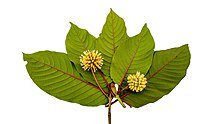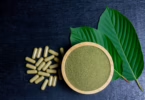Sep. 6—Among legislation Pennsylvania lawmakers will consider when they return to Harrisburg for voting sessions after an absence of more than two months is regulation of a plant-based substance that can produce opioid- and stimulant-like effects.
Although kratom and kratom-based products are legal and accessible in many areas throughout the U.S., including Pennsylvania, the Food and Drug Administration and other federal agencies continue to review emerging evidence to inform kratom policy, according to the National Institute on Drug Abuse.
Kratom is derived from leaves of a tree native to Southeast Asia and has become popular for various uses, including as a coffee-like stimulant and to fight pain and anxiety. Among the unapproved uses is for treatment of addiction; it’s believed that many of those who buy kratom are using it as a natural alternative to the prescription drug suboxone, which treats symptoms of withdrawal from opioids such as pain pills and heroin.
Kratom is not listed by the federal government as a controlled substance.
Mac Haddow, senior fellow on public policy for the American Kratom Association, said the number of people using it in the U.S. likely has surpassed 15 million.
Use of kratom has been banned in six states, though Haddow said all six bans were put in place before 2017 with FDA information that was outdated.
Another eight states have adopted provisions similar to the Kratom Consumer Protection Act championed by the association. The legislation is designed to protect consumers through processing and labeling regulations, he said.
The FDA website warns kratom appears to have properties that increase risks of addiction, abuse and dependence.
The Pennsylvania House in late June passed a bill that would ban the sale of kratom to minors, but only after provisions about manufacturing and production were stripped out and the age for legal purchase was lowered to 18 years old from 21 years old.
Haddow said while his group supports banning sale to minors, the provisions removed by amendment were necessary to keep all consumers safe. Supporters of the amendment argued most of the regulations struck from the bill were already in place.
“They are essential to really protecting consumers,” Haddow said of the series of safety measures. “We have to protect people against dangerous, adulterated products.”
Death investigation
On Aug. 19 in Lehigh County, a package bearing the words, “kratom leaf powder,” was found at the scene of the death of a 29-year-old man in Salisbury Township, Coroner Dan Buglio said.
Before that, investigations of hundreds of accidental deaths in Lehigh this year revealed no evidence of kratom. Buglio said it was too early to draw any conclusions about the Aug. 19 death.
He said kratom is certainly something of interest that investigators will test for, along with other substances in this case.
The National Institute on Drug Abuse said it supports research toward better understanding the health and safety effects of kratom use.
“Rare but serious effects have been reported in people who use kratom, including psychiatric, cardiovascular, gastrointestinal and respiratory problems,” its website stated. “Compared to deaths from other drugs, a very small number of deaths have been linked to kratom products and nearly all cases involved other drugs or contaminants.”
In Berks
Berks County Chief Deputy Coroner George Holmes said kratom has not been much of a factor in deaths since he joined the office this year following the election of Coroner John Fielding.
Holmes said he’s found it enlightening the extent to which people experiment with chemicals as alternatives or supplements to prescribed medicine.
His impression is based on the toxicology findings in many deaths his office has investigated.
Those who suffer from certain psychiatric conditions, such as schizophrenia, are prone to experimenting with different substances in search of relief from their pain or instability, he said.
There’s so much information available on the internet about the potential benefits of a herbal substance, Holmes said, but consumers often don’t consider how that substance will interact with other drugs — prescribed or illicit — they are putting into their bodies.
“All of these substances, when they come up, it’s concerning because there’s so much stuff out there, whether it’s useful or not,” he said.
Berks District Attorney John T. Adams said access by minors to an unregulated substance such as kratom is a problem.
“Unfortunately, it’s legal here,” he said. “Clearly it’s a drug that shouldn’t be available. At the very least it needs to not be available to kids.”
In May, Adams’ Berks County Drug Task force raided 14 stores that were selling vape products and removed 1,700 cannabis-based vaping and edible products commonly labeled as Delta 8 from the shelves.
The district attorney contended the labels were often misleading, giving the impression they were legal. In the judgment of the DA’s office, their concentration of THC, the chemical that produces psychoactive effects, is high enough to be classified a Schedule I controlled substance under Pennsylvania’s Controlled Substance, Drug, Device and Cosmetic Act.
Adams said his office hasn’t heard similar complaints from parents and schools about young people using kratom, but his staff tells him that kratom is sold in many of the same shops that sell or sold Delta 8 products.
Legislative action
Haddow said he continues to work with lawmakers to try to restore some of the original bill’s consumer-protection framework.
A spokesperson for state Sen. Michele Brooks, a Mercer County Republican, and chair of the Senate Health and Human Services Committee, said a pared-down version of the bill is under review. Another Republican on the committee, state Sen. David Argall Schuylkill County, said he was in favor of it.
“It’s important to ensure that we’re protecting our children from potentially harmful substances,” Argall said.
The top Democrat on the committee, state Sen. Art Haywood of Philadelphia, said that while the opioid crisis remains the highest priority in saving lives from substance abuse, other harmful substances like kratom demand attention.
“We need to reassess our approach to these substances and consider control through legalization,” Haywood said.
State Rep. Tracy Pennycuick, a Montgomery County Republican, sponsored the bill with adult-use safety provisions that got pared down.
Pennycuick, a candidate for the Senate seat being vacated by retiring state Sen. Bob Mensch, a Republican who represents parts of eastern Berks and northwest Montgomery County, said she supports the ban on sales to minors but also will reintroduce the safety measures in future bills.
Passing them is a matter of educating lawmakers on kratom, she said.
“You never know what is happening with this product,” she said. “We need to put guardrails on this so the consumers have confidence to know when they are buying kratom, they are only buying kratom.”
~ Yahoo! News







